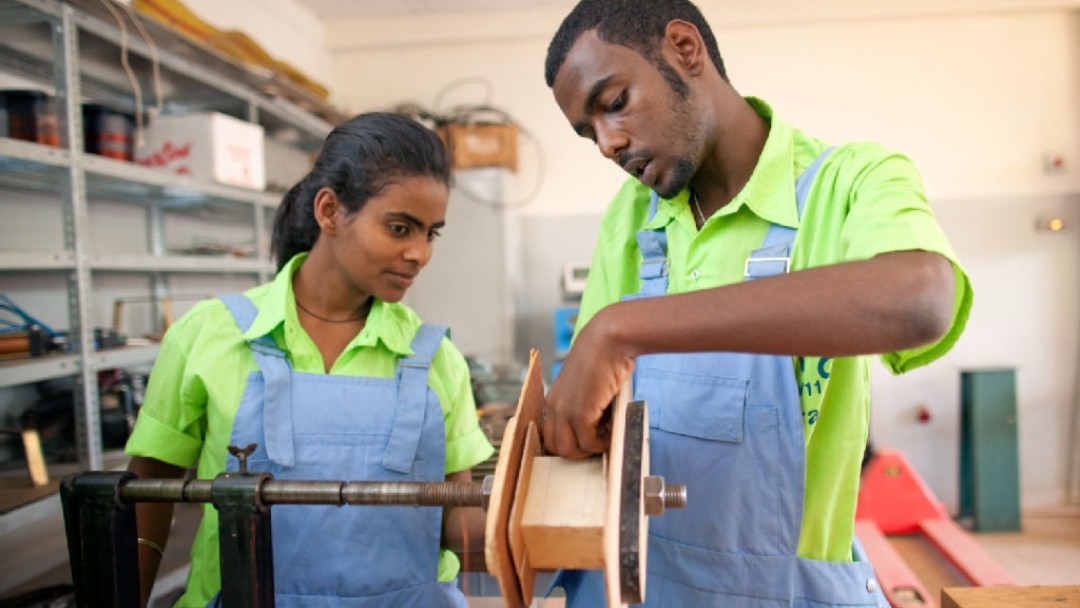
As of: 01/2024
Training that can lead to a job in the private sector – this is exactly what more and more young people in Ethiopia want after graduating from school. But this wish only comes true for very few. Especially in technical and engineering professions, the training courses are completely inadequate, as they fail to meet the needs of businesses.
KfW is supporting the Ethiopian government in redesigning training facilities so that they are practice-based. The aim is that both young people seeking training – and subsequently a job – and businesses that need qualified staff, should benefit from this project in equal measure.
Ethiopia is one of the poorest countries in the world. Most of its population work in agriculture or in the informal sector. Yet for some years now, there has been a growing private sector, even though the state continues to exercise a strong level of control over the economy. However, the Ethiopian labour market cannot adequately meet the needs of private businesses for qualified staff. Specialists are particularly hard to find in engineering and technical professions. Yet there is a large pool of labour. As is the case in many African countries, the population of Ethiopia is very young, the average age being just 17 years. Educational reforms in recent years have led to a sharp increase in the number of vocational school-leavers, but many training courses are ill-aligned with what is needed in workplace practice. This is primarily due to the fact that teachers are often inadequately trained and the facilities are poorly equipped. As a result, many young people have difficulty finding adequate jobs after completing their training.

Together with GIZ, KfW is supporting Ethiopia in the further development of its vocational training sector. On behalf of the German Federal Government, KfW Development Bank finances equipment for existing vocational colleges to improve the quality of training. The objective is to align the training courses more closely with the needs of businesses in order to increase the chances of employment for everyone who completes the training.
Another goal is to give the general population access to vocational training. The idea is to give more people from different backgrounds (such as the unemployed or early school-leavers) the opportunity to complete a course of vocational training. Refugees will also be better integrated into the training system.
Most Ethiopians work in agriculture. The sector plays a major role in the economic development of the country and the food security of the population. But it is in dire need of modernisation. In future, KfW will therefore also finance the development of new training centres within agro-industrial estates.
The companies based there are directly involved in the training. The intention here is to ensure that the students learn exactly what they will need for when they enter the labour market. As a result, vocational training is generally gaining in importance and prestige. Furthermore, graduates who are better educated can contribute to modernising and professionalising agriculture. This, in turn, will boost the productivity and quality of agricultural products and increase the chances of exporting the products.
Well-trained professionals are also needed in the medical professions. However, there is a shortage of qualified personnel in Ethiopia, especially in biomedical technology. KfW therefore supports training for professionals in this area, for example, by financing medical equipment for vocational training colleges and teaching hospitals.
Germany’s activities in Ethiopia are now showing clear signs of success. Since support began in 2002, the income and employment situation has visibly improved, especially for young people, thanks to more labour market-oriented training and qualification opportunities.
The project contributes to the achievement of these following United Nations Sustainable Development Goals:
KfW Group
KfW Development Bank
Health, education and social protection
Eastern Africa and the African Union
Share page
To share the content of this page with your network, click on one of the icons below.
Note on data protection: When you share content, your personal data is transferred to the selected network.
Data protection
Alternatively, you can also copy the short link: https://www.kfw-entwicklungsbank.de/s/enzBYz9j
Copy link Link copied